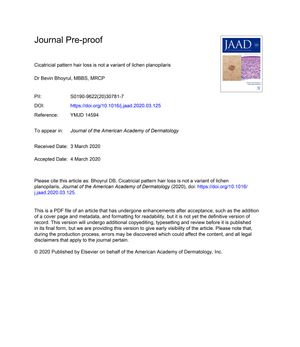TLDR Cicatricial pattern hair loss is likely advanced common baldness, not a type of lichen planopilaris.
The document, authored by Dr. Bevin Bhoyrul, challenges the classification of cicatricial pattern hair loss (CPHL) as a variant of lichen planopilaris (LPP). The author argues that CPHL is more likely to represent end-stage androgenetic alopecia (AGA) rather than a primary cicatricial alopecia. This conclusion is based on clinical observations that CPHL is asymptomatic like AGA and lacks the perifollicular erythema and scaling seen in LPP. Histologically, CPHL is characterized by features such as mild peri-infundibular or peri-isthmic lymphocytic infiltrate, concentric lamellar fibrosis, and loss of sebaceous glands, but without the interface changes in the follicular epithelium that are present in FAPD. The distinction between FAPD and CPHL is crucial for treatment decisions, as patients with LPP variants are not suitable for hair transplantation, while those with AGA may be. The author suggests that CPHL should not be considered a variant of LPP and that it represents end-stage AGA with follicular dropout and fibrosis.
35 citations
,
November 2019 in “Journal of the American Academy of Dermatology” A new variant of lichen planopilaris causing diffuse hair thinning was identified.
 170 citations
,
December 2009 in “Histopathology”
170 citations
,
December 2009 in “Histopathology” The conclusion is that accurate diagnosis of different types of hair loss requires good teamwork between skin doctors and lab experts.
 73 citations
,
November 2005 in “Journal of Investigative Dermatology Symposium Proceedings”
73 citations
,
November 2005 in “Journal of Investigative Dermatology Symposium Proceedings” Some women with common hair loss may develop permanent hair loss.
 158 citations
,
February 2000 in “Archives of dermatology”
158 citations
,
February 2000 in “Archives of dermatology” Some people with pattern hair loss may also have scalp inflammation and scarring similar to lichen planopilaris.
 309 citations
,
May 1993 in “Journal of The American Academy of Dermatology”
309 citations
,
May 1993 in “Journal of The American Academy of Dermatology” Horizontal scalp biopsy sections effectively diagnose and predict MPAA, with follicular density and inflammation impacting hair regrowth.
March 2023 in “Nigerian Journal of Clinical Practice” The main difference in hair loss for lupus patients is smaller and fewer sebaceous glands.
 1 citations
,
September 2022 in “Journal of The American Academy of Dermatology”
1 citations
,
September 2022 in “Journal of The American Academy of Dermatology” Baricitinib helps grow eyebrows and eyelashes in severe alopecia areata patients.
 August 2018 in “Oxford University Press eBooks”
August 2018 in “Oxford University Press eBooks” The document's conclusion cannot be provided because the document cannot be parsed.
 43 citations
,
August 2013 in “Pediatric Dermatology”
43 citations
,
August 2013 in “Pediatric Dermatology” Trichoscopy is good for diagnosing and monitoring hair and scalp problems in children but needs more research for certain conditions.
 245 citations
,
March 2012 in “Journal of The American Academy of Dermatology”
245 citations
,
March 2012 in “Journal of The American Academy of Dermatology” Dermatoscopy is useful for identifying different hair and scalp conditions and can reduce the need for biopsies.
 36 citations
,
May 2011 in “Dermatologic therapy”
36 citations
,
May 2011 in “Dermatologic therapy” No treatments fully cure or prevent alopecia areata; some help but have side effects or need more research.
Trichotillometry can measure hair plucking force, aiding alopecia treatment evaluation.
 5 citations
,
October 1988 in “Clinics in Dermatology”
5 citations
,
October 1988 in “Clinics in Dermatology” Minoxidil promotes hair growth but exact mechanism is unknown.











